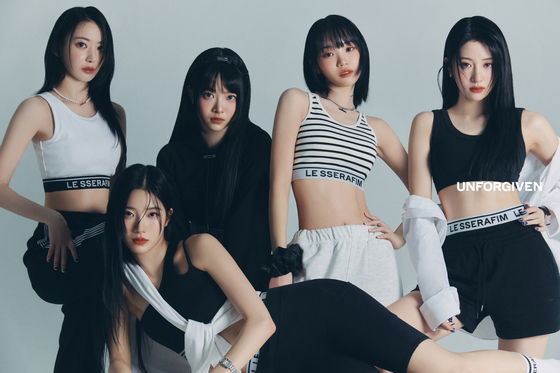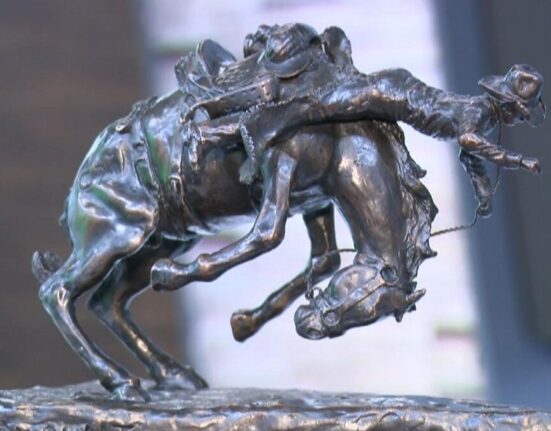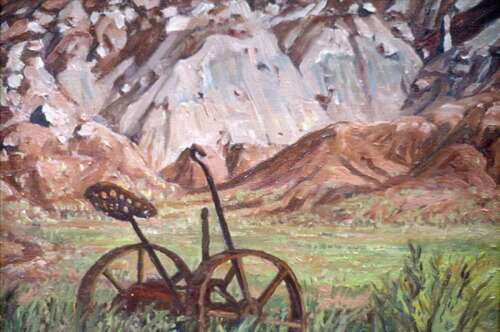![Captured scenes from girl group NewJeans' new track ″Bubble Gum″ [ADOR]](https://galleryrevieweurope.com/wp-content/uploads/2024/05/Idols-or-artists-puppets-or-producers-Shining-light-on-the.jpg)
Captured scenes from girl group NewJeans’ new track ″Bubble Gum″ [ADOR]
“ILLIT did nothing wrong, it’s the adults who made them do it who are at fault.”
These are the words of Min Hee-jin, CEO of girl group NewJeans’ agency ADOR, calling out ADOR’s parent company HYBE for “copying” the blueprint of NewJeans in the debut album of girl group ILLIT last March.
All other issues aside, Min made one thing clear: When it comes to a K-pop group’s song, choreography or concept in general, it’s the company that’s in charge — not the artists.
For a decade or so, K-pop celebrities have been referred to as either artists or idols in Korea. But the fact that their songs, dances, costumes and even verbiage used during interviews are micro-managed and laid out by their staff begs the question — to what extent are these “artists” actually responsible for their artistry? Are they the main agent of their work, who must take charge of the results, or are they simply puppets in a company-made scheme that need to be protected from the outside world?
Time and again K-pop singers have been denounced for being “factory-made” by their agencies instead of making their own music like many other musicians do around the world. But at the very heart of the conflict in the ongoing HYBE-ADOR brawl lies the groups, whose fans demand that they remain completely separated from the conflict, and the time may have come for the industry at large to decide on the roles and responsibilities of the K-pop front men.
![RM of boy band BTS [BIGHIT MUSIC]](https://galleryrevieweurope.com/wp-content/uploads/2024/05/1716077409_490_Idols-or-artists-puppets-or-producers-Shining-light-on-the.jpg)
RM of boy band BTS [BIGHIT MUSIC]
‘Factory-made’ artists
“You can call me artist, you can call me idol. Whatever you call me, I don’t care,” sang RM, lead member of K-pop’s biggest boy band BTS, in the septet’s hit dance track “Idol” (2018), describing the industry’s nicknames for K-pop stars.
But quite contrary to RM’s confidence-filled lyrics, K-pop groups have increasingly been criticized for the disappointing performances they’ve put on, driving them further away from proving themselves as true artists.
An artist, according to the Cambridge Dictionary, is someone who: paints, draws, or makes sculptures; performs music; or creates things with great skill and imagination. Music performers they may be, but whether or not they “create things with great skill” may be up for debate. With the exception of a handful of stars who have proven themselves to be skilled singer-songwriters, many struggle to perform their own songs live, let alone get involved in the creative process of the song they will be performing.
Just days before the HYBE-ADOR battle began, girl group Le Sserafim — managed by HYBE subsidiary Source Music — had been making headlines for taking the shortest amount of time for a K-pop girl group to take the Coachella music festival stage. It was only a matter of time until the words of praise turned into those lamenting the girl group’s “subpar” vocals, to put it at best, put on display at one of the world’s biggest music festivals.

051303-Hybe
There’s even a newly-coined K-pop term called “encore beolchik,” or penalty, meaning that it’s almost punishment for K-pop groups to come out as No. 1 in a weekly television music program because then they have to perform their songs live during the encore stage at the end of the show. Multiple groups have been caught on live television unable to perform their own songs properly, including Le Sserafim and even Twice.
“There’s no account of who exactly started it, but K-pop stars began to be called artists at around the early 2010s,” said a pop music critic who goes by the name Kim Zakka. “The whole idea of calling idols artists derives much from a deep-rooted inferiority complex of the entire pop music industry, not just K-pop.”
Before calling them artists, pop music stars were typically mocked as being “ddanddara,” which was specifically used to describe pop musicians as being mere entertainers without social esteem. The word artist has now been turned to a new K-pop term that refers to all K-pop stars regardless of their involvement in the creative process, rather than the exact English sense of the word, according to Kim.
“It’s not that no idol can be called an artist — just that not everyone has proven themselves as true artists,” he said. “There are singers like Soyeon of [girl group] (G)I-DLE who have definitely proven themselves as artists. But even so, the (G)I-DLE brand belongs to Cube Entertainment, not her. What that means is that, both legally and socially, she’s not responsible for anything that (G)I-DLE does because she’s still an idol who’s part of a team that was put together by the agency, not herself.”
![Min Hee-jin, the producer of girl group NewJeans and CEO of agency ADOR at left, and NewJeans [ADOR]](https://galleryrevieweurope.com/wp-content/uploads/2024/05/1716077411_905_Idols-or-artists-puppets-or-producers-Shining-light-on-the.jpg)
Min Hee-jin, the producer of girl group NewJeans and CEO of agency ADOR at left, and NewJeans [ADOR]
Who is the ‘real’ artist?
A problem that arises from idols’ lack of accountability in their work is perfectly exemplified by what’s happening in the HYBE-ADOR war right now — a complicated relationship between idols and producers, while the producers fight over the creative rights of K-pop groups whose members are forced to stay silent on all discussions mentioning their names.
Just as Min’s ADOR, four of the biggest K-pop companies in Korea were founded by producers who sought the role of both businessperson and creator — HYBE’s Bang Si-hyuk, JYP Entertainment’s Park Jin-young, YG Entertainment’s Yang Hyun-suk and SM Entertainment’s Lee Soo-man. Oftentimes these founders are likened as family members to their artists, such as Min being known as NewJeans’ mother, Bang as BTS’s father and Lee Soo-man as the teacher to SM Entertainment acts.
So when these “parents” start fighting over who made who and who should get custody, then the singers — an overwhelming number of whom are minors — are left with an experience that can seem as traumatic as a parents’ divorce, not to mention the economic mess brought on by the fluctuation in company stock prices whenever the founder gets involved in issues surrounding either corporate or private issues, as seen in SM Entertainment’s family feud with founder Lee Soo-man and his nephew and former CEO Lee Sung-soo, or YG Entertainment’s founder Yang getting involved in an illegal drugs and gambling case.
![Girl groups NewJeans, pictured top, and ILLIT [ADOR, BELIFT LAB]](https://galleryrevieweurope.com/wp-content/uploads/2024/05/1716077412_369_Idols-or-artists-puppets-or-producers-Shining-light-on-the.jpg)
Girl groups NewJeans, pictured top, and ILLIT [ADOR, BELIFT LAB]
“When Min Hee-jin mentioned during her press conference that the NewJeans members ‘called her up crying because they were worried she might kill herself,’ that right there is emotional abuse from an adult to a minor,” culture critic Cho Eun-jai said.
During her press conference last month, Min mentioned ILLIT as the “NewJeans copycat” and two certain members of Le Sserafim as being “the reason that NewJeans’ debut was pushed back.” Min also said that members of NewJeans called her at night to check up on her and that certain members told her they will “speak out” for her sake.
“Yes, the discussions directly mention the names NewJeans, ILLIT and Le Sserafim, but did they ever have any say in anything that they’re being criticized for?” Cho said.
“Everything was decided for them, and there’s no reason for them to speak out about something they’re not responsible for. The fact that the artists have no power over their music may not make sense to people unfamiliar with the territory, but that is the reality of the K-pop market and the mindset we need to keep to protect these people — most of whom are young and inexperienced.”
![Wreaths of flowers displaying boy band BTS's fans' messages of disapproval with BigHit Music, the band's label, and its parent company HYBE's management are displayed in front of HYBE's headquarters in Yongsan District, central Seoul, on May 3. [YONHAP]](https://galleryrevieweurope.com/wp-content/uploads/2024/05/1716077412_387_Idols-or-artists-puppets-or-producers-Shining-light-on-the.jpg)
Wreaths of flowers displaying boy band BTS’s fans’ messages of disapproval with BigHit Music, the band’s label, and its parent company HYBE’s management are displayed in front of HYBE’s headquarters in Yongsan District, central Seoul, on May 3. [YONHAP]
Popping the K-pop bubble, again
A month has now passed since the HYBE-ADOR conflict first broke, when the former began an audit against the latter. There have already been two court hearings, a police report, accusations of shamanism and religious cults and more, making it seem less likely for the two parties to come to an amicable agreement any time soon.
Harm has already been done to the artists, companies and other individuals whose reputations have been damaged due to the battle, but that may have been necessary to pop the bubble that had been growing at a perhaps too-rapid pace in all corners of the industry.
Re-evaluating the artist terminology isn’t meant to belittle K-pop stars’ efforts or achievements in any way, but actually should be a means of taking the unnecessary burden off of their shoulders by clearing out the boundaries of the responsibility they do hold as singers, dancers and performers, as opposed to the things they shouldn’t be responsible for as “artists” or creators of the whole brand, experts say.
“The K-pop industry grew too fast, with no time to reassess the pros and cons of its system like other long-standing industries have,” Jin Dal-yong, professor at the School of Communication at Simon Fraser University, said.
![Bang Si-hyuk, chairman of HYBE at left, and Min Hee-jin, CEO of ADOR [YONHAP]](https://galleryrevieweurope.com/wp-content/uploads/2024/05/1716077413_109_Idols-or-artists-puppets-or-producers-Shining-light-on-the.jpg)
Bang Si-hyuk, chairman of HYBE at left, and Min Hee-jin, CEO of ADOR [YONHAP]
“The term artist and the unimaginable amount of fame, as well as responsibility, that they are given goes in line with the nonsensical conflict between HYBE and ADOR. Where else on earth would you find a subsidiary demanding its parent company to step away from its work? Sorting out the roles of each constituent of the market is imperative for the sustainability of the industry as a whole, not just this current situation.”
And “please remember once again that there are real people behind each accusation and criticism,” critic Kim Do-heon said.
“The members have no choice but to smile and push through every controversy with their name stuck on it,” he said.
“We have to try to remember how each member would be feeling to see everyone talk about them but without being able to speak out in any way. Peaceful cohabitation between HYBE and ADOR may be out the window, but every star, staff and producer — even Min Hee-jin, whose work has irrefutably been one of the best in K-pop — has to be respected to find the most peaceful conclusion possible.”
BY YOON SO-YEON [yoon.soyeon@joongang.co.kr]






